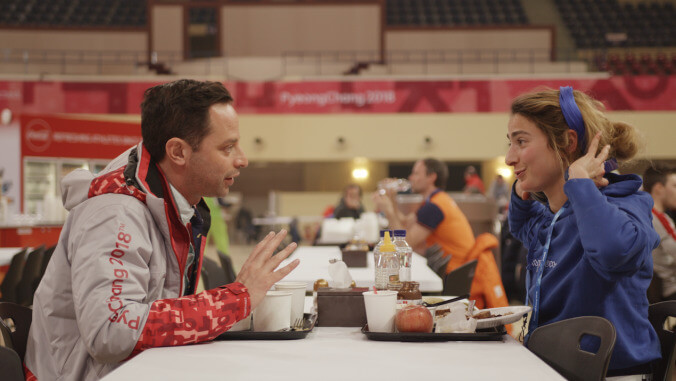Being shot at the Olympics is about all the Nick Kroll romance Olympic Dreams has going for it

Shot during the 2018 Winter games in Pyeongchang, Olympic Dreams plays a bit like Escape From Tomorrow, the no-budget indie that was notable exclusively for having been shot guerrilla-style on location at Disney World and Epcot. In this case, the filmmakers had express permission from the powers that be, yet there’s still a pronounced sense of watching scenes hastily captured on the fly while the actual business of that venue swirls around them. With the exception of Nick Kroll, everyone in the cast is a real-life Olympic athlete (their sports appear beside their names in the closing credits), and the movie’s primary draw is the inside look it provides at the Olympic Village, seen here as the milieu for a tentative romance rather than merely as the background in news or documentary footage. As with Escape From Tomorrow, however, the resulting sketchy narrative would be of relatively little interest absent its novelty factor. This is a more professional-looking production, with a much stronger cast, but it has the same half-assed feel.
That’s especially true when it comes to Penelope (Alexi Pappas), who’s in Pyeongchang to compete as a cross-country skier. Pappas is actually a track-and-field star—she set a new Greek record in the women’s 10,000-meter race in Rio De Janeiro, though she finished a distant 17th overall—and Olympic Dreams barely makes an effort to show her in action, presumably for logistical reasons. Instead, the film gets Penelope’s somewhat disappointing performance at the games out of the way early, giving her little to do apart from hang out with Ezra (Kroll), a volunteer dentist who starts up an awkward conversation with her in the cafeteria. The two become fast friends, wandering around the Village together and even taking in a bit of South Korea proper, via colorful montage sequences that are blatantly less interested in Penelope and Ezra than they are in the local sights (ice sculptures, neon discos, etc.) that the two explore. Some perfunctory conflict arises when Ezra doesn’t return Penelope’s impulsive kiss (he’s “on a break,” Ross-style, from a girlfriend back home), but mostly they spend their time encouraging each other to pursue their dreams: hers for Olympic glory, his to start a family practice rather than work at a clinic.
If that doesn’t sound terribly exciting, well, it isn’t. Olympic Dreams was jointly conceived by Kroll, Pappas, and director Jeremy Teicher (Pappas’ husband; they previously collaborated on the little-seen indie Tracktown), and they seem to have imagined its central relationship as a gloss on Lost In Translation: Older man and younger woman, adrift in an unfamiliar land, cling to each other for emotional support, and perhaps something more. Teicher doesn’t possess Sofia Coppola’s gift for woozy atmosphere, though, and while both actors do solid work, they don’t have the time to create richly detailed characters.
It’s almost painfully obvious that the film’s dialogue was improvised during shooting; everyone constantly looks and sounds just a bit anxious, as if they’re under significant pressure to come up with something interesting to say. (Sole exception: Gus Kenworthy, a freestyle skiing champ—he won the silver medal in men’s slopestyle at the 2014 Winter Olympics—who’s almost preternaturally relaxed in front of the camera. It was no surprise to discover that he’s acted before, playing a key role in the most recent season of American Horror Story.) Kroll would normally thrive in such circumstances, but this is a “serious” role, so he mostly steps on his comic instincts, making Ezra ordinary verging on bland. Eventually, nobody can think of anything better than the hackneyed dash to the airport (represented here by the Olympic Village bus terminal) that serves as the climax of every third rom-com. That isn’t even worth the bronze.